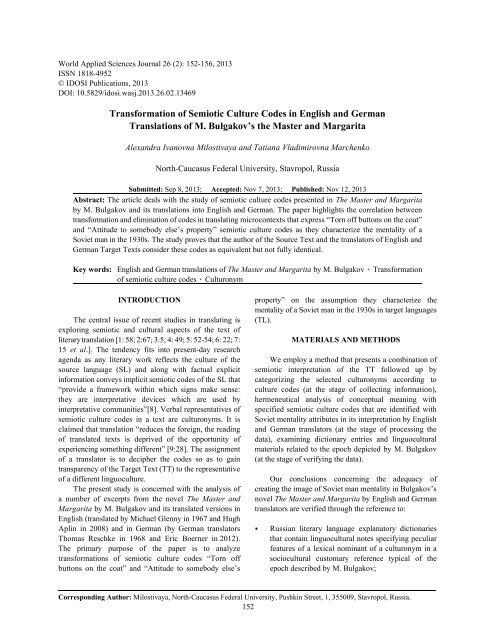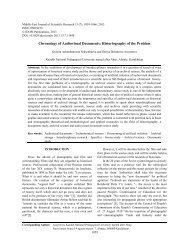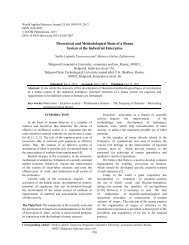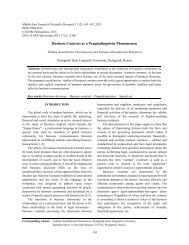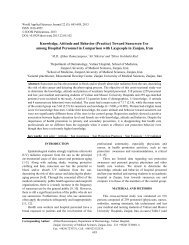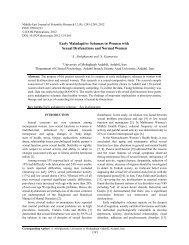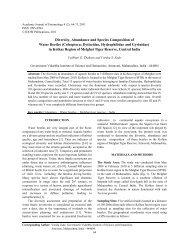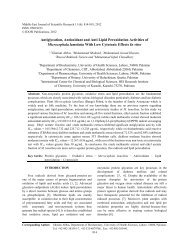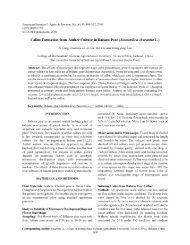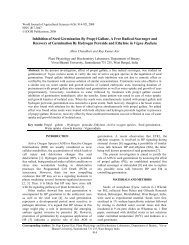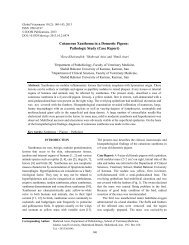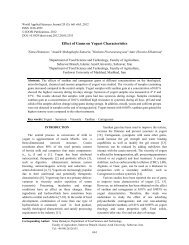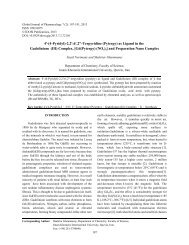Full Text - Idosi.org
Full Text - Idosi.org
Full Text - Idosi.org
You also want an ePaper? Increase the reach of your titles
YUMPU automatically turns print PDFs into web optimized ePapers that Google loves.
World Applied Sciences Journal 26 (2): 152-156, 2013<br />
ISSN 1818-4952<br />
© IDOSI Publications, 2013<br />
DOI: 10.5829/idosi.wasj.2013.26.02.13469<br />
Transformation of Semiotic Culture Codes in English and German<br />
Translations of M. Bulgakov’s the Master and Margarita<br />
Alexandra Ivanovna Milostivaya and Tatiana Vladimirovna Marchenko<br />
North-Caucasus Federal University, Stavropol, Russia<br />
Submitted: Sep 8, 2013; Accepted: Nov 7, 2013; Published: Nov 12, 2013<br />
Abstract: The article deals with the study of semiotic culture codes presented in The Master and Margarita<br />
by M. Bulgakov and its translations into English and German. The paper highlights the correlation between<br />
transformation and elimination of codes in translating microcontexts that express “Torn off buttons on the coat”<br />
and “Attitude to somebody else’s property” semiotic culture codes as they characterize the mentality of a<br />
Soviet man in the 1930s. The study proves that the author of the Source <strong>Text</strong> and the translators of English and<br />
German Target <strong>Text</strong>s consider these codes as equivalent but not fully identical.<br />
Key words: English and German translations of The Master and Margarita by M. Bulgakov<br />
of semiotic culture codes Culturonym<br />
Transformation<br />
INTRODUCTION property” on the assumption they characterize the<br />
mentality of a Soviet man in the 1930s in target languages<br />
The central issue of recent studies in translating is (TL).<br />
exploring semiotic and cultural aspects of the text of<br />
literary translation [1: 58; 2:67; 3:5; 4: 49; 5: 52-54; 6: 22; 7:<br />
MATERIALS AND METHODS<br />
15 et al.]. The tendency fits into present-day research<br />
agenda as any literary work reflects the culture of the We employ a method that presents a combination of<br />
source language (SL) and along with factual explicit semiotic interpretation of the TT followed up by<br />
information conveys implicit semiotic codes of the SL that categorizing the selected culturonyms according to<br />
“provide a framework within which signs make sense: culture codes (at the stage of collecting information),<br />
they are interpretative devices which are used by hermeneutical analysis of conceptual meaning with<br />
interpretative communities”[8]. Verbal representatives of specified semiotic culture codes that are identified with<br />
semiotic culture codes in a text are culturonyms. It is Soviet mentality attributes in its interpretation by English<br />
claimed that translation “reduces the foreign, the reading and German translators (at the stage of processing the<br />
of translated texts is deprived of the opportunity of data), examining dictionary entries and linguocultural<br />
experiencing something different” [9:28]. The assignment materials related to the epoch depicted by M. Bulgakov<br />
of a translator is to decipher the codes so as to gain (at the stage of verifying the data).<br />
transparency of the Target <strong>Text</strong> (TT) to the representative<br />
of a different linguoculture.<br />
Our conclusions concerning the adequacy of<br />
The present study is concerned with the analysis of creating the image of Soviet man mentality in Bulgakov’s<br />
a number of excerpts from the novel The Master and novel The Master and Margarita by English and German<br />
Margarita by M. Bulgakov and its translated versions in translators are verified through the reference to:<br />
English (translated by Michael Glenny in 1967 and Hugh<br />
Aplin in 2008) and in German (by German translators Russian literary language explanatory dictionaries<br />
Thomas Reschke in 1968 and Eric Boerner in 2012). that contain linguocultural notes specifying peculiar<br />
The primary purpose of the paper is to analyze features of a lexical nominant of a culturonym in a<br />
transformations of semiotic culture codes “Torn off sociocultural customary reference typical of the<br />
buttons on the coat” and “Attitude to somebody else’s epoch described by M. Bulgakov;<br />
Corresponding Author: Milostivaya, North-Caucasus Federal University, Pushkin Street, 1, 355009, Stavropol, Russia.<br />
152
World Appl. Sci. J., 26 (2): 152-156, 2013<br />
Literary works of other authors contemporary with stand ich nachts in demselben Mantel, aber mit<br />
M. Bulgakov and documentary books by later abgerissenen Knöpfen wieder auf meinem kleinen<br />
authors; Hof und kr mmte mich vor Külte”. [14: 187].<br />
Informants-representatives of Soviet communication<br />
culture of the period in question;<br />
Four months passed since somebody had knocked<br />
Target versions of other literary works of M. on the door of Master’s apartment and the January<br />
Bulgakov’s contemporaries that depicted similar morning when right in the same coat he came back to his<br />
phenomena typical of Soviet people’s life.<br />
courtyard. In the context of sociopolitical situation of the<br />
epoch depicted in M. Bulgakov’s novel it is obvious that<br />
Analysis: The semiotic culture code can be conveyed in the character was being kept in the Gulag. But due to the<br />
M. Bulgakov’s novel as implicit hidden meaning that tabooed character of the topic at that time the author does<br />
co-exits with explicit meaning in one and the same not express it in an explicit way. Subtext information about<br />
utterance and the one that is supposed to be interpreted the Master’s stay in the Gulag is conveyed through the<br />
by receptor. These are language units contained in the semiotic code “Torn off buttons on the coat”. It is known<br />
text that reveal implicit information.<br />
that in Soviet forced camps the buttons were usually torn<br />
off from the prisoner’s clothes. Consequently, the fact<br />
The passage below exemplifies the case in which the that the Master came back home after quite long-term<br />
subtext is expressed by means of semiotic code rendering absence and without buttons on his coat is the evidence<br />
such minor detail, as it could seem at first sight, as Torn that he stayed at some place of imprisonment. In Soviet<br />
off buttons on the coat:<br />
prisons inmates were deprived of buttons on their clothes<br />
and there are some references to it in passages from<br />
epe e ep aca oc e o o, a o a novels by Gulag’s historiographer A. Solzhenitsyn:<br />
o y a e , o e o a oc y a ... The prisoner had already been deprived of all rights<br />
a, a o , o o e ap , o , o e when they cut off his buttons on the threshold of State<br />
ca o a o, o y e c o op a Security and he couldn't avoid a stretch [15: 291].<br />
y o a , a c o xo o a oe op e. It is obvious that a foreigner will fail to decode this<br />
[10: 148] implicit information. The passage should be supplied with<br />
“A quarter of an hour after she left me there was a some explanatory commentary to decode the semiotic<br />
knock on my window…”<br />
culture code. Besides, an English translator M. Glenny<br />
“Yes and so, in mid-January, at night, in the same failed to render such a relevant scheme of the code as<br />
overcoat, but with the buttons torn off, I was huddled ‘The use of violence to the character’. The translation<br />
against the cold in my little yard”. [11: 149] equivalent employed by the translator – ‘without any<br />
buttons’ – just states that the object is missing. But the<br />
‘A quarter of an hour after she had left me there came expression in the ST ‘c o op a y o a ’<br />
a knock at my window…’<br />
(‘with buttons torn off’) and its equivalent in German<br />
‘Yes, so there I stood, out in my little yard, one night ‘mitabgerissenen Knöpfen’ imply that the Master was<br />
in the middle of January, wearing the same overcoat subjected to the influence of the third party. So it is<br />
but without any buttons now and I was freezing with reasonable to conclude that the semiotic culture code is<br />
cold’. [12: 171-172]<br />
expressed in a more precise way in H. Aplin’s version and<br />
in German translation versions of The Master and<br />
“Eine Viertelstunde, nachdem sie mich verlassen Margarita than in the English version by M. Glenny.<br />
hatte, klopfte man bei mir ans Fenster…”<br />
According to English and German native speakers<br />
“ Ja, also, Mitte Januar, nachts, im selben Mantel, that participated in our survey the fact that the scheme<br />
doch mit abgerissenen Knöpfen, krümmte ich mich ‘The use of violence to the character’ is actualized in three<br />
vor Kälte in meinem kleinen Hof”. [13: 162-163] out of four given target passages under consideration<br />
does not ensure the decoding of linguoculturological<br />
“Eine Viertelstunde, nachdem sie mich verlassen information about the prison and the arrest. Informants<br />
hatte, klopfte es bei mir ans Fenster…”<br />
associate the missing buttons on the clothes with<br />
“Ja, es war inzwischen Mitte Januar geworden, da vagrancy and asocial behavior of the character.<br />
153
World Appl. Sci. J., 26 (2): 152-156, 2013<br />
Let us consider some other examples of everyday Reschke to ‘free car’ / ‘der Dienstwagen’. The attribute<br />
situations in interpersonal communication of Soviet ‘ a e a ’ (‘public’) is supplied with a less formal<br />
people that are described in M. Bulgakov’s novel. English equivalent ‘free’ (literally speaking: ‘a free of<br />
The translation of these passages in English and in charge car’) and a German one ‘Dienst-’ (literally<br />
German reveals differences in mentalities of the nations speaking: ‘service car’). Here the semantic compression<br />
that take part in translatology communication. People who takes place as the lexeme is deprived of a shade of<br />
lived on the territory of the former USSR had a special formality. Due to this fact the TT does not verbally<br />
attitude to property as it was not owned by any particular express such feature of mentality typical of a Russian man<br />
person that time. The property was public and nobody’s in Soviet times as estrangement and disregard for<br />
at the same time, i.e. official or public. everything that is not privately owned. Besides, M.<br />
Glenny’s version of the text does not make it clear why<br />
Ushakov’s Dictionary of Russian literary language the use of ‘a free car’ (‘ ec a o a ’) is<br />
gives the following definitions of the word ‘ a e ’ reprehensible.<br />
(‘official’, ‘public’): It should be noted that so far there is no<br />
communicatively adequate way to render the semiotic<br />
One that has something to do with the Treasury, code in point. If we consider English and German versions<br />
publicly owned;<br />
of literary works by contemporaries of M. Bulgakov we<br />
Formal, bureaucratic;<br />
will come across similar loose equivalents of the word<br />
Not notable, common, stereotypical, without any ‘ a e ’ (‘official’, ‘public’):<br />
originality [16: 1282]. … op o a e e a e a o<br />
pe o o a a. ( , e po 1991a, 389) –<br />
This is how English and German translators rendered …trade in government medicaments at the time of the<br />
the nomination of exclusively Soviet type of property: famine and the typhus epidemic [17: 248] – …Handel mit<br />
staatlichen Medikamenten in der Hunger- und Typhuszeit<br />
a y p o e a e y ! – a e a [18: 268-269];<br />
o , y p . [10: 85]. o a- o, apc e pe e a, e e po a<br />
“He misuses an official car!” the cat snitched on p cy c e x ec po o ac o pa ape y.<br />
him, chewing a mushroom [11: 83]. pa e a oco a opo a a e o e e ... [19: 241]<br />
‘Drives around in a free car!’ said the cat – A long time ago, in the days the tsar, the furnishing of<br />
slanderously, chewing a mushroom [12: 100]. public places was standartized. A special pedigree of<br />
“Ein üerlüssiges Rädchen im Staatsgetriebe”, official furniture was bred. [17: 8] – Früher, unterm Zaren,<br />
verleumdete ihn auch der Kater, seinen Pilz kauend. waren Amtsstuben nach Schema möbeliert worden. Man<br />
[13: 89]. hatte eigens eine Rasse vom ärarischen Möbel gezüchtet<br />
“Er treibt Missbrauch mit dem Dienstwagen!” – [19: 14-15].<br />
petzte der Kater und kaute den Pilz. [14: 106].<br />
Here Ch. Malamuth, a Russian emigrant who<br />
translated I. Ilf and Y. Petrov, in one case employed the<br />
No doubt the ST conveys the first dictionary same equivalent as H. Aplin – ‘official’. As we have<br />
meaning of the lexeme ‘ a e ’ (‘official’, already noted it does not fully render the implied<br />
‘public’). It is likely that the lexicographers that compiled connotation. In a different case the translator opted for<br />
the dictionaries at the Soviet period omitted the ‘government’ (literally speaking: ‘official’, ‘state’) though<br />
contemptuous shade of meaning inherent in the it cannot be extrapolated to fictional background in<br />
nomination for ideological reasons.<br />
Bulgakov’s passage. It is obvious there is no refential<br />
While choosing the equivalent for the word in identity. Though S. Likhodeyev, the character who makes<br />
question English and German translators (H. Aplin and E. the remark, holds an executive position he has no right to<br />
Boerner) follow the semantic definition provided by dispose of official, governmental transport. Most likely<br />
dictionaries in the source language. They view it, first of the matter in the novel concerns the property ofvariety<br />
all, as property owned by the state (‘an official car’ / theatre run by the character. So the analysis of translated<br />
‘Rädchen im Staatsgetriebe’). Rendering the word passages from a literary work containing the same<br />
combination ‘ a e a a a’ M. Glenny and T. sociocultural realities as in The Master and Margarita<br />
154
World Appl. Sci. J., 26 (2): 152-156, 2013<br />
was not efficient in identifying a more communicatively on the coat” and “Attitude to somebody else’s<br />
adequate equivalent to render the semiotic culture code property” – show in most cases these codes are viewed<br />
conveyed by the lexeme ‘ a e ’ (‘official’, ‘public’) by the author of the source text (ST) and English and<br />
than in M. Glenny’s and H. Aplin’s versions.<br />
German translators as equivalent but not completely<br />
In the passage given above, T. Reschke who identical.<br />
translated both M. Bulgakov and I. Ilf and Y. Petrov It is essential that many losses in rendering implicit<br />
employs some other equivalents of the lexeme ‘ a e ’ information that characterizes the mentality of a Soviet<br />
(‘official’, ‘public’) that seem significantly specific in man in The Master and Margaritaby M. Bulgakov stem<br />
cultural and semiotic aspects. We have already touched from objective reasons. The key preconditions are<br />
upon weak and strong points of the equivalent with systemic interlingual differences, asymmetry of culture<br />
‘staat-’ root and we would like to analyze the ‘ärarisch’ realities and stylistic norms. But transformations of<br />
equivalent in more detail. This lexeme originates from semiotic culture codes in question also result from<br />
Latin and it has a limited sphere of use in German as subjective factors, i.e. the capability of a translator to<br />
regards the stylistic aspect (the style of official adequately decode the intentions implied by the author of<br />
documents, the substyle of legal documents) and the the ST.<br />
territorial aspect (Austriazismus). The explanatory<br />
dictionary of foreign words Langenscheidt Findings: Present-day globalization results in<br />
marks‘ärarisch’ as a derived word from a noun ‘Ärar’ rapprochement between peoples. The bounds and<br />
meaning 1. ‘Staatsschatz’, ‘Staatsvermögen’ 2. ‘Fiskus’, differences fade away together with traditions and<br />
‘Staatskasse’ 3.‘Staatsarchiv’ [20]. The e-corpus of the everyday life items and the words that denote them.<br />
German language of the XX c. offers the following typical Culturological aspect in translatology is explicitly claimed<br />
context revealing the functioning of the lexeme in to be relevant nowadays. Linguoculturological,<br />
question:<br />
communicative paradigm is the dominating one in current<br />
Überhaupt ist die ärarische Schreibtischausstattung translatology studies: the same words are interpreted by<br />
mit den vielen Stempeln,Federhaltern und Tintenfaß,die representatives of different cultures in different ways, to<br />
das Gewand des Ärmelschonerbedürftigen bedrohte, say nothing of divergence in reality. Language<br />
durch den reinlichen PC abgelüst worden… [21].<br />
peculiarities are closely related to the mentality of a<br />
So the lexeme ‘ärarisch’ can refer to furniture (see the people. These features become most obvious in critical<br />
contexts in Digitales Würterbuchderdeutschen ambivalent historical epochs and the epoch of socialism<br />
Sprachedes 20. Jahrhunderts). But the referential content development in the USSR depicted in the novel by M.<br />
is just a reference to a particular form of property, not Bulgakov is one of them.<br />
emotional and evaluative connotations immanent in the Our study proves that the mentality of a people and<br />
Russian lexeme ‘kazyonniy’ (‘official’, ‘public’). Therefore the peculiarities of its vision find their reflection in literary<br />
the analysis of a German version of a literary work after I. works. The language specifies feelings and associations<br />
Ilf and Ye. Petrov, similar to M. Bulgakov’s novel as in language signs denoting culture realia – culturonyms<br />
regards the period of creation and subject matter, failed to that explicitly reveal semiotic culture codes. It is the<br />
identify a more communicatively adequate equivalent of translation of the words related to culture that poses<br />
the word ‘ a e ’ (‘official’, ‘public’) as compared challenges. Sometimes a translator fails to preserve all<br />
with versions submitted by T. Reschke and E. Boerner. lexemes and convey all semantic elements embedded in a<br />
word or word combination. There are also cases when the<br />
CONCLUSION<br />
number of elements is increased. In this case formal or<br />
semantic transformation takes place. The study of<br />
The conclusions of the study highlight that adequate culturonym transformations proves to be essential to<br />
decoding of semiotic culture codes and selecting their produce a communicatively equivalent target text.<br />
equivalents in the TL and culture in Russian-English and<br />
Russian-German translation of The Master and Margarita<br />
REFERENCES<br />
by M. Bulgakov is a relevant condition for producing a<br />
communicatively equivalent TT focused on the target 1. Garbovskiy, N. and O.Kostikova, 2012. Science of<br />
culture mentality. The semiotic culture codes that reveal Translation Today: Change of Scientific Paradigm.<br />
the mentality of a Soviet man in 1930s – “Torn off buttons Meta, 57(1): 48-66.<br />
155
World Appl. Sci. J., 26 (2): 152-156, 2013<br />
2. Sturge, K., 2009. Cultural translation. In Routledge 11. Bulgakov, M., 2008. The Master and Margarita.<br />
Encyclopedia of Translation Studies,Eds., Baker, M. Trans. H. Aplin. London: Oneworld Classics LTD.<br />
and G. Saldanha. Abingdon: Routledge, pp: 67-70. 12. Bulgakov, M., 2004 The Master and Margarita. Trans.<br />
3. Venuti, L., 1992. Introduction. In Rethinking M. Glenny. London: Vintage.<br />
Translation, Ed., Venuti, L. London: Routledge, 13. Bulgakow, M., 2012. Der Meister und Margarita.<br />
pp: 1-17.<br />
Trans. E. Boerner. Norderstedt: Norderstedt Books<br />
4. Hickey, L., 2001. Literary Translation within a on Demand.<br />
Pragmatic Framework. InThe Other Within. Vol. II: 14. Bulgakow, M., 2008. Der Meister und Margarita.<br />
Aspects of Language and Culture, Ed., Kitis, E. Trans. T. Reschke. München: Random House GmbH.<br />
Thessaloniki: Athanasios A. Altintzis, pp: 49-62. 15. Solzhenitsyn, A., 1974. The Gulag Archipelago.<br />
5. Aixela, J.F., 1996. Culture-specific Items in Trans. by T. Whitney.NY: HARPER & ROW, pp: 1.<br />
Translation. In Translation, Power, Subversion,Eds., 16. Ushakov, D., 1935. Tolkovyj slovar' russkogo jazyka.<br />
Alvarez, R. and C. A. Vidal. Clevedon/Philadelphia: Moscow: OGIZ, pp: 1.<br />
Multilingual Matters, pp: 52-79.<br />
17. Ilf, I. and E. Petrov, 1991. Zolotoj telenok. In<br />
6. Bassnett, S., 2002. Translation Studies. NY: Taylor & Dvenadcat' stul'ev.Zolotoj telenok. Elista: KKI, pp:<br />
Francis. 235-480.<br />
7. Stecconi, U., 2007. Five reasons why semiotics is 18. Ilf, I. and E. Petrov, 1932. The Little Golden Calf.<br />
good for Translation Studies. In Doubts and Trans. by Ch. Malamuth. NY.: Farrar & Rinehard.<br />
directions in translation studies, Eds., Gambier, Y., 19. Ilf, I. and J. Petrow, 1979. Das goldene Kalb oder die<br />
M.Shlesinger and R. Stolze. Amsterdam: Benjamins, Jagd nach der Million. Trans. T. Reschke. Berlin: Volk<br />
pp: 15-26.<br />
und Welt.<br />
8. Chandler, D., 2013. Semiotics for Beginners. Date 20. Langenscheidt. Foreign dictionary. Date<br />
Views 01.09.2013 www.users.aber.ac.uk/ dgc/ Views25.08.2012www.services.langenscheidt.de/fre<br />
Documents/ S4B/sem-gloss.html<br />
mdwb/fremdwb.html.<br />
9. Yifeng, S., 2006. Translating Foreign Otherness. 21. Digitales Dictionary of the German language 20.<br />
Across Languages and Cultures, 7(1): 23-36. Jahrhunderts.Date Views 25.08.2012<br />
10. Bulgakov, M., 1988. Master i Margarita. Moscow: www.dwds.de/?qu=%C3%A4rarisch&submit_butt<br />
Sovetskaya Literatura.<br />
on=Suche&view=1.<br />
156


